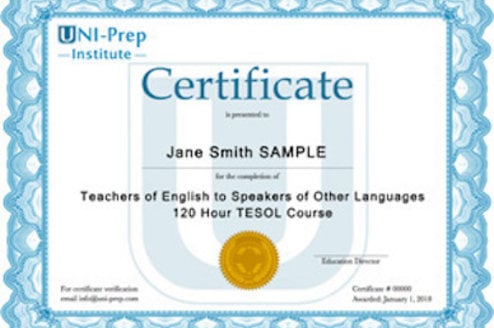Teach English in Croatia
Teaching Programs in Croatia
About
Croatia has only recently landed on the map of mainstream European travel, but it has always been an incredible place to visit. You'll find one of the best coastlines in Europe, stunning natural landscapes, and fascinating cities filled with ancient ruins, cute little cafes, and cultural events. All of this, plus low prices that blow countries like France and the UK out of the water.
With all of these attractions, it’s no wonder more and more people are choosing to stay for longer. Teaching in Croatia would give you an opportunity to go beyond the tourist highlights and get to know this gem of a country as a local. You’ll find a wonderfully welcoming people, as well as a few pockets of expats, to guide you along your way.
Job Types
Unless you speak Croatian (or get a job at an international or bilingual school), chances are you’ll be teaching English. There are several types of institutions that offer these jobs, although some will be significantly easier to join.
Language Schools
Most English teaching jobs in Croatia are in private language schools in the main cities. You could be teaching children or adults, in groups or one-on-one. These jobs are usually part-time, although in bigger cities you might be able to combine a few part-time jobs.
International Schools
International schools are usually private institutions, catering mostly to children of expats. Some of them operate with English as the main language, which means they are some of the only places where you could hope to teach something other than English (say, if you already have a background as a Math teacher). Salaries are high and, as a result, competition is fierce.
Public Schools
It is technically possible to find a job teaching English at a regular public school in Croatia, but it is not easy. First of all, you’ll need a Masters in Education. Secondly, you’ll need enough Croatian to navigate the job hunting process, including sending resumes and carrying out interviews.
Tutoring
Tutoring is an unreliable form of income, but it can be a useful way to supplement a part-time job. It is also the easiest job to set up, so it can be a way to tide you over when you arrive until you find more stable employment.
Finding a Job
There is high demand for English teaching jobs in Croatia, and there isn't a particularly large influx of people looking for them. As a result, it's not too difficult to find work, although only some positions will be available to those who don't speak Croatian.
When to Apply for Jobs in Croatia
Language schools tend to hire for the months of July, August, and September since most private language courses start in September and run to a similar schedule than a regular school calendar. Some jobs open up in January, so December can also be a good time to look.
How to Apply for Jobs in Croatia
Start by looking for positions in private language schools and, if you're an experienced teacher, international schools. Go straight to their website to look for job postings or get in touch directly to ask about the process.
Online communication can sometimes be lacking in Croatia, so do not be discouraged if you don’t get quick responses to applications. When possible, call. Skype and phone interviews can be easily arranged.
If you have the means, it could be a good idea to head straight there and talk to schools face-to-face -- it’s not an expensive place to spend a couple of weeks, and you’ll have a better chance of making an impression.
Average Salary of Teaching Jobs in Croatia
A teacher’s salary in Croatia will be enough for you to live comfortably (especially as living costs are low), but probably not enough for you to build up savings. Between $800 and $1,200 a month is standard for part-time work at a language school, while international schools pay upwards of $2,000 a month.
Qualifications Needed
All English teaching jobs in Croatia require a TEFL qualification or equivalent (such as CELTA). Most jobs ask for at least a year’s teaching experience, but this is not a requirement across the board.
Need to Know
Croatia is a great place to live: beautiful, relaxed, with a low cost of living and unique culture. However, it is much less popular than many of its European counterparts. This means a more interesting cultural experience and fewer tourists, but it also means there are less support and infrastructure for expats. Brush up on your Croatian and get planning.
Popular Destinations to Teach in Croatia
Zagreb, the capital, has the most jobs and is a cool little city with a busy cultural life. Croatia’s second city is Split, whose incredible beaches and ancient heritage place it alongside major European capitals in terms of charm and year-round appeal. Other cities worth looking into include Rijeka and Osijek.
Visas & Sponsorship
Unless you are an EU citizen, you will need a work permit to teach in Croatia. This can be arranged at your closest embassy or consulate. You will need proof of your employment offer, and your employer will also have to provide some documentation.
An EU Blue Card entitles you to work in any EU state for up to two years, but any other work visa will be limited to 12 months. After that, you can renew it from Croatia.
Teacher Work Culture in Croatia
Unless you speak Croatian and/or have a degree in Education, chances are you will be working in a language school. The work culture can be fun, since other teachers are likely to also be foreigners, and you will have a community already built into your new life. That said, you should make an effort to meet Croatian locals in order to really immerse yourself in the place.
Classroom Etiquette in Croatia
Classroom etiquette doesn’t differ much from what you would be used to. Avoid sensitive topics like religion and politics, especially with adult students.
Note for teachers: pointing your thumb, index finger, and middle finger (like some people would do to indicate the number 3) is a gesture linked to Serbian nationalism and could be very offensive to Croatians. When discussing numbers, use your ring, middle, and index fingers for 3.
Health & Safety
Croatia is a generally safe country with good healthcare -- all you need to do to ensure your peace of mind is get insurance. Croatia has exceptional beaches and nature, so make sure you are covered for any water or adventure sports you may want to try.















